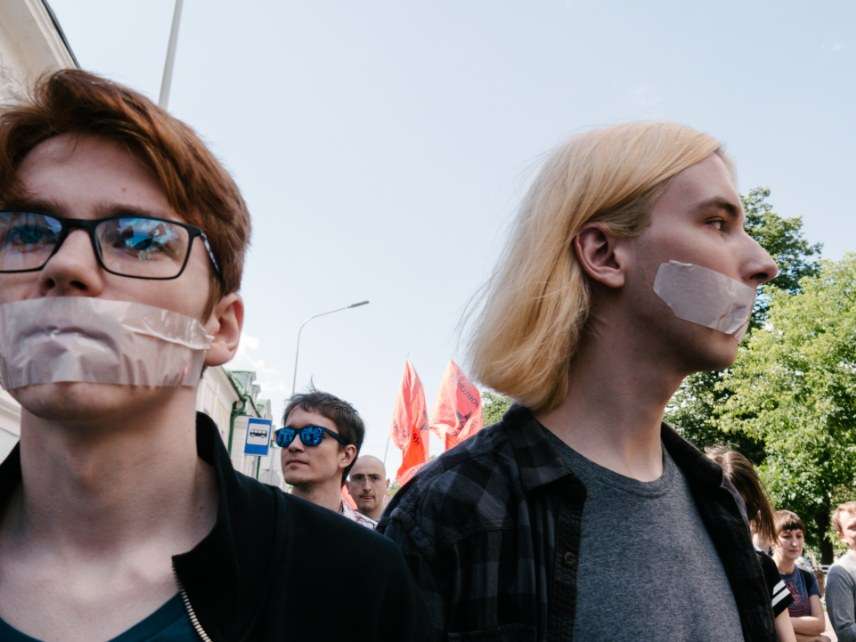Why Are Media Outlets Giving Commentary Space to Wannabe Censors?
Any authority to shut down speech will be turned toward the press eventually.

This week, The Washington Post joins several other large media outlets in giving commentary space to an academic who thinks the First Amendment maybe shouldn't protect so much free speech.
I'll give Jennifer Delton—Skidmore College's "Douglas Family Chair in American culture, history, and literary and interdisciplinary studies"—this much: She's not disguising her calls for censorship of conservative opinion by claiming this will achieve some sort of racial enlightenment or equality. She openly describes this censorship as a tool for stopping the spread of political arguments she sees as dangerous.
Her example is the purge of Communist Party members from unions, the civil service, and academia in the middle of the 20th century because they were a threat to the established liberal control of the Democratic Party. The argument was that these Communists did not actually believe in free speech (probably true) and were using it as a shield to protect them while they attempt to undermine democracy.
She sees similar tactics in the alt-right, which Delton says is using speech as a weapon to attack liberal values and colleges:
It is true that higher education has brought much of this on itself through the extreme policing of speech and tolerance of student protesters who shut down speakers with whom they disagree. But that doesn't diminish the extent to which the alt-right and conservatives are using "free speech" to attack and destroy colleges and universities, which have long promoted different variations of the internationalist, secular, cosmopolitan, multicultural liberalism that marks the thinking of educated elites of both parties.
Hilariously, she ends her commentary by saying the process of depriving these bad people of their First Amendment freedoms should not be used to censor "liberal critics" of college or government behavior. Only wrong people should be censored!
The title of this op-ed, by the way, is "When 'free speech' becomes a political weapon." Writers aren't typically responsible for their headlines, but her op-ed does describe speech as a weapon; the title reflects the piece accurately. So it's worth wondering whether Delton even grasps that she wants censorship to be a political weapon. She wants to use the government to shut down speech that undermines the institutions she and many others value. It's almost as though she understands the actual underpinnings of Supreme Court case that brought us the tiresome "fire in a crowded theater" trope—a case that revolved around the prosecution of anti-war protest—and still supports the ruling.
It's also fascinating in that Delton doesn't seem to want to engage in the idea that academia could actually win a debate on these issues. There is no hint in her story there could be a debate in which the values she holds dear change minds and influence people. Her commentary opens with a stark—but completely false—choice for college presidents: Either they let conservatives speak and "risk violent counterprotests" or they censor speakers and "confirm" the speech crisis. She sees those as the only two options, as though it's simply not possible to stop violence at protests.
Many of us outside the academic bubble keep reminding folks that if the government has the authority to decide what sort of speech gets censored, it won't be people like Delton calling the shots, and that in all likelihood, it will be the weakest and least influential of our citizens who will be punished.
Now that so many of these commentaries have found homes at major media sites, it's also worth asking: What the bloody hell are these massive news outlets thinking when they run these?
Certainly news outlets should run whatever commentaries they want, and it's beneficial to present a range of different views. Don't take this as a call for media censorship, just for more thoughtful judgment.
We happen to have a president openly at war with the media and who has very little understanding or concern about the First Amendment. When major media outlets give such a high profile to commentaries that call for political censorship, are they not aware that this could blow back on them as well? Is this like media criticism of the Citizens United decision, where newspapers think that they'd be immune to censorship of corporations because the First Amendment has distinct, separate protections for the press?
Delton's justifications for compromising the First Amendment can very easily be adapted to call for censorship of the media as well. The Trump administration is openly flirting with going after media outlets who publish confidential government information. Their argument is that these leaks undermine the government and American democracy. That sounds a lot iike Delton's argument, just with a different target in mind.


Show Comments (70)